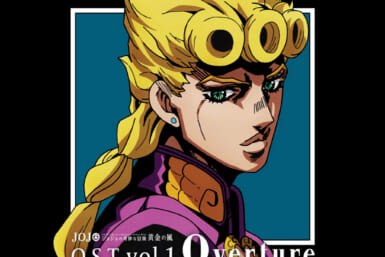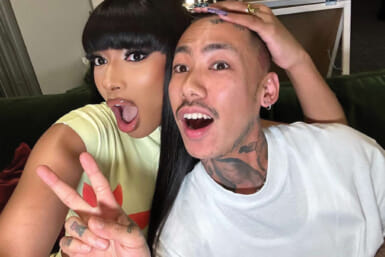Spoilt for choice by the number of excellent releases in July, there is a Japanese album for everyone. Nippon Columbia’s collection of traditional folk songs from Awa (modern-day Tokushima), Hundred Views of Awa, brought together and remastered by Makoto Kubota, is fascinating; as are Kaoru Inoue’s enveloping, atmospheric electronica works Of Mythic Future and We Hear the Last Decades Dreaming.
Then there’s Ai Aso’s The Faintest Hint, her first studio album in 13 years, an unusually eerie, spacious dream pop work, as well as Betcover!!’s indie all-rounder Confession and the un-pronounceable [.que]’s (Cue? Kay? Dot cue/kay?) serene And Inside – not to mention the city pop revivalist, K-pop hybrid of Yukika’s Soul Lady. Truly, something for everyone and, below, some of my personal favorite Japanese albums from July 2020.
1. Mom, ‘21st Century Cultboi Ride a Sk8board’
(JVCKENWOOD Victor)
Mom’s third major label release most fully realizes his vision of “craft hip hop,” a lo-fi, collaged hybrid of hip hop and indie pop. Sharp, frenzied and shapeshifting, 21st Century Cultboi Ride a Sk8board pushes Mom’s musicianship further: not just in terms of the complexity of his instrumentals but as a paced, mature work that entertains a well-thought-out wider concept.
21st Century Cultboi pessimistically imagines 2040 through the eyes of an outcasted, nonconformist “cultboi,” an abstract theme that thinly veils many of Mom’s thoughts towards contemporary society. Mom’s near future is solitary and depressed and his lyrics both openly and metaphorically display raw instincts of frustration and violence. Yet, while depression and hostility lingers over much of 21st Century Cultboi, it isn’t without a decent amount of dark comedy and light-hearted relief – a lot of which is communicated within the moods of his instrumentals.
Mom’s signature polyphonic, collaged style cuts through heavy rock, abstract hip hop, folk, alt-R&B and neo-psychedelia in only a few tracks. Most impressive, however, is the natural manner in which he fits it all together. On the surface, his sound is colorful and distinctive. Underneath, it is stunningly disorientating. Mom leaves his listener wondering where he’s sourced his samples (indeed, many of them are samples of his own demos) and exactly how he’s managed to fit them together.
Coming away from 21st Century Cultboi, it’s difficult not to be blown away by its mix of dense innovation and sincere social commentary. So far as anxious predictions of a devastated near future go, when Mom emerges from all his detail and chaos, few are so tuneful and dreamlike, and fewer are so admirably engrossed – and engrossing – in their own niche of world-building pop music.
2. Satoko Shibata, ‘Slow-In’
(P-Vine)

Grounded resolutely in little more than herself and her guitar, Slow-In is Satoko Shibata’s most stripped-back, acoustic release in years. From that set-up ensues clarity, an EP that emphasizes the strength of her songwriting and lucidity of her lyricism.
The four tracks are each surreal and picturesque, emotionally perceptive and intriguingly abstract. In terms of Shibata’s lyrics, vocals and guitar play, all are playful and somewhat unconventional. Full of subtly conceptual metaphors and unfiltered emotions, she is all the more fascinating simply because she feels no need to determine or overexplain her songs. There are no grand clarifications or resolutions, only poignant, instinctive aphorisms and vignettes.
And when the instrumentals of Slow-In eventually build upon the simplicity of Shibata’s voice and guitar, the arrangements are nothing short of exquisite. Most mood-setting are the unrushed funk plod to “Friends” and looming contrabass under “Bad Day,” while open beauty is found in the amounting of piano, cello, contrabass and horns on “Strange Island” and graceful baroque transitions on “Why.”
Slow-In may appear simple and understated but that in itself is exactly why it thrives. Shibata’s songwriting is contemplative and unforced and Slow-In is quietly, comfortably astounding.
3. Boris, ‘No’
(Self-released)
Fitting for an age of such confined frustration, protean icons Boris have thumped out an album of punishing, cathartic crust punk. After dabbling with less aggressive styles on last year’s droning LφVE & EVφL, Takeshi, Wata and Atsuo channel into No crust punk’s filthy meld of hardcore punk and extreme metal, underlined by a spirit of heated, politicised apocalypticism.
As one would expect from such restless and indefinable musicians as Boris, No does not consist of any single style. Elements of sludge metal, one of few genres that one could feasibly pin Boris to with any consistency thanks to Pink, Heavy Rocks and Akuma no Uta, are on show in more weighty, measured tracks “Genesis,” “The Mirror -Zerkalo-” and “Loveless.” On “HxCxHxC -Perforation Line-” there are clear influences of lighter melodic hardcore, while the trio wander off with ambience in the final “Interlude.”
Performed with typically immaculate flair despite being self-recorded in quarantine, No is weighty, riffing and generally thrilling. In Boris’ accompanying essay, they deem this “extremely healing music” and one can’t help but agree. No is a welcome dose of fury that gorges on one’s anxieties – easily Boris’ most untamed, most exciting work in a decade.
4. NENE, ‘Yumetaro’
(Mary Joy)
Combining themes of sexual and gender empowerment within an overall concept that loosely concerns the legendary yokai, bewitching spectres of Japanese folklore, Yumetaro is Nene’s most notable solo release so far. The artwork specifically depicts a rokurokubi, the long-and-winding-necked yokai associated with wandering souls – fitting for an artist who, normally known as half of experimental hip hop and trap duo Yurufuwa Gang, is conceivably still testing out the waters as a solo artist.
Nene’s previous record, her 2017 self-titled debut, was never as forthright, nor so distinctive as even the least impactful numbers here. The first half of Yumetaro offers Nene’s honest views on love and sex, as well as her insecurities, vulnerabilities and role in an otherwise male-dominated genre. The second returns to her usual, invincible self. Awich’s appearance on “Make It” drives a song full of braggadocio and proud female sexuality, while Japanese hip hop legend Nipps adds even more of a sense of madness to final track “Inferno.”
Nene and Yurufuwa Gang’s music has long been some sort of calling to disaffected youth, but with Yumetaro that call is more than just anti-establishment or anti-authority. Powerful and euphoric but with a honed purpose, Nene challenges those structures with more focus, more drive and the punch of a personal touch.
P.S. It’s worth mentioning the simultaneously released Goa, a collaborative EP also involving Nene’s Yurufuwa Gang. A bonkers trance mix of rave beats, folk instrumentation and demented sound effects, of the two, I personally prefer Yumetaro – though only because it makes me feel more sane.
5. Dos Monos, ‘Dos Siki’
(Deathbomb Arc)
Having grasped exactly what makes their style of sample-heavy, abstract hip hop so sought-after – Dos Monos are pushing it further. The trio’s lyrics thrive as endlessly interpretable pits of abstract imagery and metaphor, while their instrumentals prove magnetic because of their lawless discordance and adventurous sampling. Dos Siki, their second album, builds upon this appeal, a work of only four songs and 15 minutes that manages to prove more consuming than most standard-length projects.
Dos Siki’s most noticeable evolution concerns its beats. The identifiable snippets, stemming from the likes of American avant-gardist Captain Beefheart and Japanese jazz musician Jun Fukamachi – far stranger than the warped old jazz tunes of Dos City – are virtually unrecognizable. Piled-on layers and ruthless tempo manipulation transform them into a kind of jazzy, boom-bap-influenced noise rap, more rewarding given their increased prominence and equal-placing alongside the rapping.
As far as the lyrics go, you may have to come back to me in six months or so. Zo Zhit, Botsu and TaiTan all thrive on densely enigmatic imagery and metaphors riddled with rich symbolism and references to art, film, philosophy, historical events and pop culture. An album of Dos Monos lyricism leaves me with a dictionary in one hand and an encyclopaedia in the other; everything feasibly linkable but nothing overtly so.
Given the mere week I’ve had with Dos Siki, I’m only certain that it contains some of the most creative bars of the year so far. Among instrumentals that are equally fascinating, Dos Siki balances experimentality and entertainment – Dos Monos’ most accomplished album yet.









